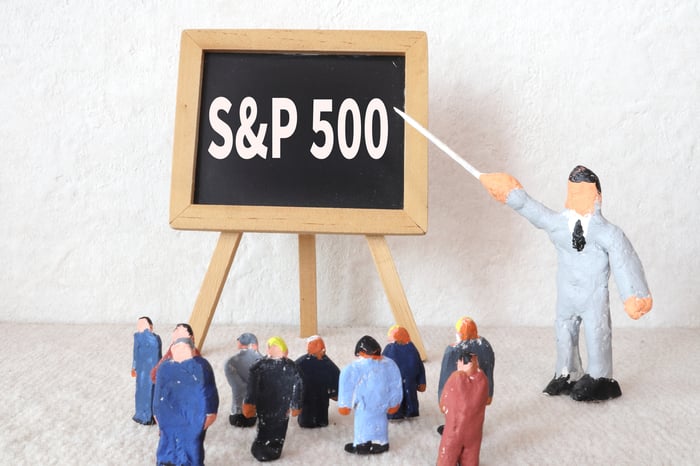For decades, investors have closely followed Warren Buffett's market commentary, shareholder letters, and discussions at Berkshire Hathaway's ( BRK.A 1.06%) ( BRK.B 1.04%) annual shareholder meetings. These kernels of wisdom help filter out market noise and serve as a reminder to focus on fundamentals.
Despite an identity built around buying businesses and picking winning stocks, Buffett has long advocated that investors who aren't interested in closely following markets may want to consider an S&P 500 ( ^GSPC 0.83%) index fund as a tool for compounding wealth .
With a staggering 19.9% of the total market cap of the S&P 500 allocated to just three stocks -- Nvidia ( NVDA 0.57%), Microsoft ( MSFT 0.45%), and Apple ( AAPL 0.55%) -- investors may be wondering if Buffett is giving the green light to buy these top growth stocks around all-time highs, or if there's a deeper meaning to his S&P 500 index fund investment thesis.

Image source: Getty Images.
Of winners and losers
The S&P 500 isn't a stagnant index with set weights. Rather, it is an evolving instrument that represents 500 of the largest U.S. companies by value.
Its components have undergone drastic changes over time. Thirty years ago, the five largest companies by market cap were ExxonMobil, Coca-Cola, Merck, Bank of America, and Raytheon (now RTX). And none of those companies were worth over $100 billion. Tech companies like Microsoft, IBM, and Intel were much smaller.
Jump to 2005, and ExxonMobil was still the biggest company, but Microsoft was second, followed by Citigroup, General Electric, and Walmart.
In 2015, megacap tech stocks began to dominate, with Apple, Alphabet, and Microsoft the three largest companies, with Berkshire fourth and ExxonMobil dropping to fifth. Yet even then, no company was worth over $600 billion.
Fast-forward to 2025, and the largest eight companies by market cap in the S&P 500 are all growth-focused -- with the " Ten Titans " making up 38% of the index . Berkshire is the ninth-most-valuable S&P 500 company. And all nine sport market caps over $1 trillion, including three companies worth over $3 trillion each .
By buying the S&P 500 and holding it over time, an investor isn't necessarily betting on the current leaders. Rather, they're making a bet on the U.S. economy and capturing the big winners that offset underperformance or even steep losses from other holdings. Nvidia alone has created over $4 trillion in market cap over the last three years . That level of wealth creation can offset countless blunders and mistakes from other S&P 500 components. Picking Nvidia and leaving out the rest would have been the optimal solution, in hindsight. However, the investor who bought an S&P 500 index fund has a stake in Nvidia and avoids missing out completely on the artificial intelligence boat.
Berkshire continues to express caution
Despite Buffett's recommendation, a look at the composition of the index compared to Berkshire's decision-making in recent years presents a contradiction.
Berkshire holds a record amount of cash , cash equivalents, and short-term Treasury bills . Berkshire has bought back its own stock in the past, but it hasn't done so now for four consecutive quarters . And although Berkshire has made some recent buys, it has undergone 11 consecutive quarters of net selling , including ongoing trimming of key holdings like Apple and Bank of America.
It's also worth mentioning that Berkshire didn't meaningfully increase its position in mega-cap growth stocks during any of the three major sell-offs over the last five years -- the COVID-19-induced downturn in 2020, the 2022 bear market , or the tariff-induced sell-off earlier this year.
So if Berkshire is hoarding cash, not repurchasing its own stock, and not taking decisive action during severe market dips, it's clear that Buffett and his team continue to execute caution in today's premium-priced market .
Observing rather than following in Berkshire's footsteps
Buffett has a track record of going years without making meaningful moves in the stock market if he doesn't see enough opportunities . However, that doesn't mean long-term investors should follow suit and keep a ton of cash on the sidelines.
The best way to approach today's market is within the context of your own investment objectives and financial goals. If you have a long time horizon and high-risk tolerance, buying an index fund dominated by Ten Titans growth stocks is no big deal. But if you have a lower risk tolerance and shorter investment time horizon, it may be more sensible to offset the premium valuation and low yield of the S&P 500 with dividend-paying value stocks.




